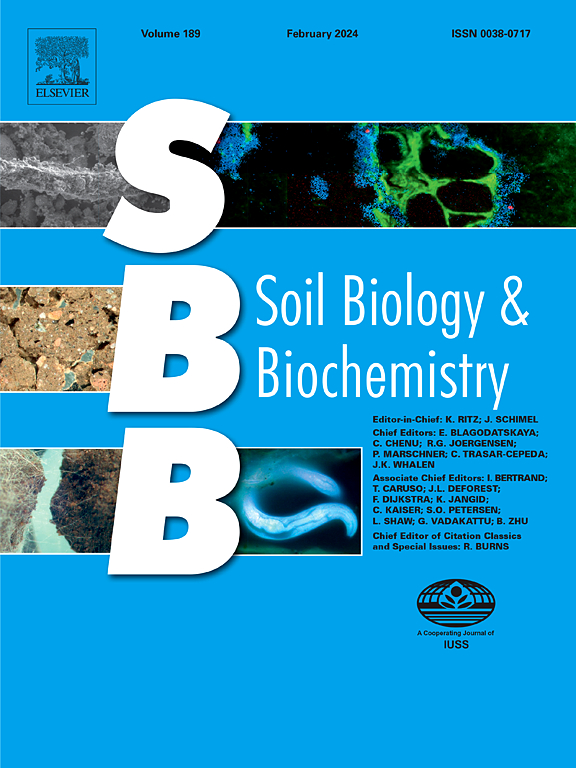土壤微生物在模拟根分泌物中优先使用有机酸而不是糖
IF 9.8
1区 农林科学
Q1 SOIL SCIENCE
引用次数: 0
摘要
糖和有机酸是植物根系分泌物的主要成分,被认为可以促进根际有机物的微生物分解。然而,它们对微生物活动和养分动员的具体影响仍然知之甚少。在这里,我们模拟被动根渗出来研究糖和有机酸对根际微生物代谢的不同影响。我们通过反向微透析将13c标记的糖和/或有机酸释放到完整的草甸和森林土壤中超过6小时。我们测量了底物诱导的微生物呼吸、土壤有机质矿化、代谢物浓度和底物与脂质衍生脂肪酸的结合。我们的研究结果表明,微生物对有机酸的偏好明显高于糖,有机酸从渗出点被更快地去除,并优先被微生物呼吸。与糖不同,有机酸增加了渗出点附近微生物代谢副产物和阳离子(K, Ca, Mg)的浓度。我们的结果挑战了普遍的假设,即糖是土壤微生物最容易获得和快速消耗的底物。微生物对有机酸的偏好表明了快速生物量增长和ATP产量之间的权衡。我们的研究结果强调了分泌物组成在影响微生物动力学和养分有效性方面的重要作用,并强调了根际生物和非生物反馈机制在调节根分泌物中的重要性。本文章由计算机程序翻译,如有差异,请以英文原文为准。
Preferential use of organic acids over sugars by soil microbes in simulated root exudation
Sugars and organic acids, primary components in plant root exudates, are thought to enhance microbial decomposition of organic matter in the rhizosphere. However, their specific impacts on microbial activity and nutrient mobilisation remain poorly understood. Here, we simulated passive root exudation to investigate the distinct effects of sugars and organic acids on microbial metabolism in the rhizosphere. We released 13C-labelled sugars and/or organic acids via reverse microdialysis into intact meadow and forest soils over 6-h. We measured substrate-induced microbial respiration, soil organic matter mineralization, metabolite concentrations, and substrate incorporation into lipid-derived fatty acids. Our results reveal a pronounced microbial preference for organic acids over sugars, with organic acids being removed faster from the exudation spot and preferentially respired by microbes. Unlike sugars, organic acids increased concentrations of microbial metabolic byproducts and cations (K, Ca, Mg) near the exudation spot. Our results challenge the prevailing assumption that sugars are the most readily available and rapidly consumed substrates for soil microbes. Microbial preference for organic acids indicates a trade-off between rapid biomass growth and ATP yield. Our findings underscore the significant role of exudate composition in influencing microbial dynamics and nutrient availability, and emphasize the importance of biotic and abiotic feedback mechanisms in the rhizosphere in regulating root exudation.
求助全文
通过发布文献求助,成功后即可免费获取论文全文。
去求助
来源期刊

Soil Biology & Biochemistry
农林科学-土壤科学
CiteScore
16.90
自引率
9.30%
发文量
312
审稿时长
49 days
期刊介绍:
Soil Biology & Biochemistry publishes original research articles of international significance focusing on biological processes in soil and their applications to soil and environmental quality. Major topics include the ecology and biochemical processes of soil organisms, their effects on the environment, and interactions with plants. The journal also welcomes state-of-the-art reviews and discussions on contemporary research in soil biology and biochemistry.
 求助内容:
求助内容: 应助结果提醒方式:
应助结果提醒方式:


